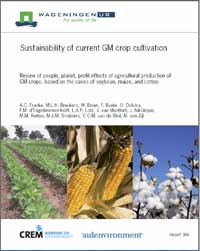Wageningen, The Netherlands
May 16, 2011
 The production of genetically modified (GM) crops outside of the Netherlands can make a clear contribution to sustainable agriculture at a local level. However, the eventual impact on sustainability, expressed in the effects on People, Planet and Profit, does not depend only on trait, crop species, and production method but also on the local context. In this framework, GM crops are similar to other innovations in agriculture. This was shown by research carried out by Wageningen University & Research Centre and research and consultancy companies CREM BV and Aidenvironment. The research report was presented to the Dutch Parliament by the Ministry of Economic Affairs, Agriculture & Innovations (EL&I) and the Ministry of Infrastructure and the Environment (I&M) 12 May 2011.
The production of genetically modified (GM) crops outside of the Netherlands can make a clear contribution to sustainable agriculture at a local level. However, the eventual impact on sustainability, expressed in the effects on People, Planet and Profit, does not depend only on trait, crop species, and production method but also on the local context. In this framework, GM crops are similar to other innovations in agriculture. This was shown by research carried out by Wageningen University & Research Centre and research and consultancy companies CREM BV and Aidenvironment. The research report was presented to the Dutch Parliament by the Ministry of Economic Affairs, Agriculture & Innovations (EL&I) and the Ministry of Infrastructure and the Environment (I&M) 12 May 2011.
No genetically modified crops are produced commercially in the Netherlands, and the production of these crops within the EU is very limited. The Netherlands does, however, import many products containing GM crops. The Dutch government is now considering whether the production of GM crops for the benefit of the Dutch economy is in line with the Dutch policy regarding, among other things, increasing the sustainability of agriculture.
To answer this question, the Ministry of EL&I initiated a study that was carried out by two Wageningen UR institutes, Plant Research International and LEI, in cooperation with research and consultancy companies CREM BV and Aidenvironment. The study was based on literature covering fifteen years of commercial GM production of soy, maize and cotton. After being reviewed by international experts, the report was presented to the Dutch Lower house on Thursday 12 May 2011.
The study shows that the current commercially produced GM crops can make a positive contribution to various 'People, Planet and Profit' components that were evaluated. The effect on sustainability depends on the built-in GM trait and the crop species, but the region, institutional environment and the degree of integration within good agricultural practice also have a major influence on the eventual effect on sustainability. These latter issues are not specific to GM crops and apply to agricultural systems and innovations in general.
The abovementioned factors jointly determine whether production, GM or non-GM, is in line with a policy that aims to increase sustainability in agriculture. Although it is not possible to draw any simple general conclusions, the study does outline an approach in which new GM crops with other traits than the currently studied herbicide tolerance (HT) and Bt insect resistance can be evaluated case-by-case for their potential effect on sustainability.
A digital copy of the complete report (in English) is available via: http://edepot.wur.nl/166665
The public version of the report (in Dutch) is available via: http://edepot.wur.nl/168073